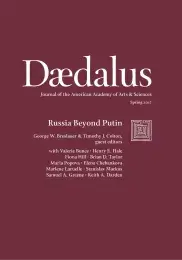The Russian Siloviki & Political Change
The siloviki – Russian security and military personnel – are a key part of Team Putin. They are not, however, a coherent group, and there are important organizational and factional cleavages among the siloviki. Compared with some security and military forces around the world, Russian military and security forces generally lack the attributes that would make them a proactive and cohesive actor in bringing about fundamental political change in Russia. In the face of potential revolutionary change, most Russian military and security bodies do not have the cohesion or the will to defend the regime with significant violence. Russian siloviki are a conservative force supportive of the status quo. Future efforts by the siloviki to maintain the stability of the existing political order are most likely to be reactive, divided, and behind the scenes.
The Russian elite under Vladimir Putin, according to conventional wisdom, are dominated by men in uniform. The Russian sociologist Olga Kryshtanovskaya was one of the first experts to make this claim, dubbing Putin’s regime a “militocracy” dominated by people with backgrounds in the secret police, the military, and law enforcement organs: the siloviki. Average Russians agree; in polls they have consistently stated that, most of all, Putin represents the interests of the siloviki. A related approach, although partially at odds with the militocracy scheme, contends that Putin’s Russia is a “neo-KBG state,” maintaining that the KGB evolved from being “a state within the state” in the Soviet Union to “the state itself” under Putin. Thus, in this narrower conception, it is not just any man in uniform, but only chekisty (from the name of the early Soviet secret police, the Cheka) who run Putin’s Russia.1
If Russia is a militocracy or a neo-KGB state, it logically stands to reason that siloviki or chekisty will likely play an equally prominent role in a post-Putin political system. A powerful faction within the elite, with special access to both power (guns) and knowledge (state intelligence), the siloviki are well-positioned to . . .
